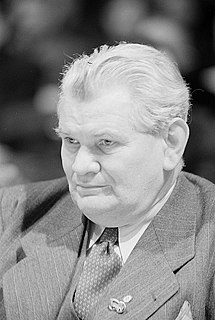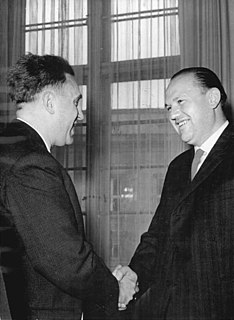
The Publicly Owned Enterprise was the main legal form of industrial enterprise in East Germany. They were all publicly owned and were formed after mass nationalisation between 1945 and the early 1960s, and the handing back in 1954 of some 33 enterprises previously taken by the Soviet Union as reparations.

Helmuth Markov is a German politician.
The Council of Ministers was the cabinet and head of government of the German Democratic Republic from November 1950 until the country was reunified on 3 October 1990. Originally formed as a body of 18 members, by 1989 the council consisted of 44 members.

Teltow [German pronunciation: ['tɛltoː](listen)] is a town in the Potsdam-Mittelmark district, in Brandenburg, Germany.

Max Seydewitz was a German politician. Between 1947 and 1952 he was the Minister-President of Saxony in the German Democratic Republic.

The rail vehicle factory in Hennigsdorf, Germany, was founded in 1910 by AEG. Locomotive production began in 1913, and in the 1930s absorbed the work of the August Borsig locomotive factory, being renamed the Borsig Lokomotiv Werke GmbH until 1944. After the Second World War the factory was nationalised in the German Democratic Republic and produced electric locomotives for home use and for export, mainly to Communist Bloc countries under the name Lokomotivbau-Elektrotechnische Werke (LEW).
Klaus Henkes was a German soldier.
Manfred Bochmann was an East German politician who served as his country's Minister for Geology for fifteen years.
Christian Mahler (1905-1966) was a Communist Party activist who resisted Naziism and spent most of the Hitler period in forced custody. After 1945 he became a party functionary in the German Democratic Republic and then an increasingly senior Police officer. He concluded his career as the first director of the Sachsenhausen National Memorial.

Rolf Frick was a German university professor and politician.
Dr. Rudi Georgi was a politician and public official in the German Democratic Republic.
Hartmut Sieckmann is a German Engineer and regional politician (FDP).

Günther Wyschofsky is a former politician and official in the German Democratic Republic. He became a member of the powerful Central Committee of the country's ruling Socialist Unity Party in 1964. For more than two decades he also served as junior Minister for the Chemicals Industry.
Helmut Kirchberg was a German mining scientist. In 1953 he was appointed Rector of the Freiberg University of Mining and Technology.
Michael Schumann was a German philosophy professor who became an East German advocate for reform and a politician during the build-up to German reunification. He is widely seen as a pioneer of the Party of Democratic Socialism which superseded the Socialist Unity Party in the German Democratic Republic in 1989/90.
Hans Jürgen Rösler was a German mineralogy professor. He was the author of a wide range of publications and core teaching texts, including "Geochemische Tabellen" and "The Mineralogy Textbook".

Hans Joachim Meyer is a German politician (CDU). He served in the de Maizière cabinet as the last East German Minister for Education and the Arts. After reunification he became Secretary of State for Sciences and the Arts in the regional government of Saxony. In addition, he served between 1997 and 2009 as President of the Central Committee of German Catholics .
Willy Sägebrecht was a political activist and politician from the Communist Party of Germany who was incarcerated as a resistance activist during the Nazi period. After 1945 he became a member of East Germany's powerful Party Central Committee and then, in 1957, head of the country's Military Intelligence Service.

Dietmar Keller was an East German politician (SED/PDS) who served as Minister for Culture in the Modrow government. After reunification he sat as a member of the German parliament ("Bundestag") between 1990 and 1994.

Hans Bentzien (1927–2015) was a German writer and politician who served as the culture minister of East Germany from 1961 to 1966. Being a member of the ruling party Socialist Unity Party (SED), he held several political and public posts in East Germany.









